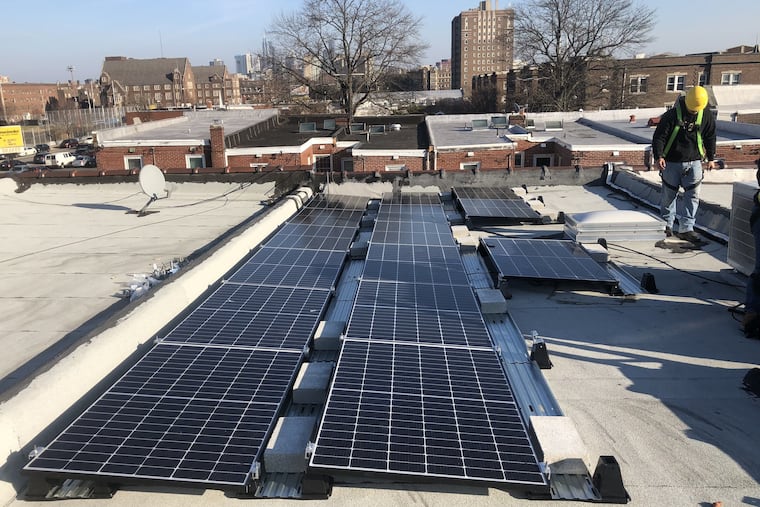Peco should step up on solar to make the Philly region healthier | Opinion
Solar can create more local jobs than any other energy source. Why aren't we using more of it?

As winter settles in and the pandemic accelerates across our region, we are collectively preparing for increased suffering and uncertainty. The week of Thanksgiving, for instance, The Inquirer reported that 52% of families in Pennsylvania feared a hungry holiday season. With employment rates stagnating, particularly among the working class, families are facing a winter of hard choices as they decide which needs to prioritize — to, say, shop for groceries or pay their Peco energy bill.
Those are just the immediate concerns. In the long term, Pennsylvanians also need energy providers to invest in a sustainable future. Our campaign, Power Local Green Jobs, has spent the last five years demanding that Peco, the region’s privately owned energy provider, put forth a plan that prioritizes our region’s collective health. At a time when so many citizens are facing unemployment and increased medical risk, Peco has the chance to lead our region away from crisis by creating thousands of green energy jobs to usher in an era of clean air and collective prosperity. The disturbing truth, however, is that Peco lacks a comprehensive climate plan. It has responded to this moment by doubling down on its old, fossil fuel-based energy model that has been damaging respiratory health and accelerating climate change for decades.
» READ MORE: Philly program to power its buildings by solar faces setback
The suffering caused by environmental neglect is never evenly distributed. Take, for example, the chronic respiratory conditions caused by air pollution in cities, often experienced by fence-line communities neighboring fossil fuel facilities. Research has linked such pollution to more severe complications from COVID-19. These circumstances are not accidental; they are the consequences of decades of racist policy. And this summer, as temperatures hit record highs, residents without access to air-conditioning were forced to choose between exposure to heatstroke at home or exposure to COVID-19 in community cooling centers. A 2020 heat study reported a disparity of up to 22 degrees between Philadelphia’s poorest, densest neighborhoods and its more spacious, affluent counterparts.
If any good comes from this pandemic, it will be that it forces us to face such deadly inequality, which will only increase with climate change — unless regional power brokers can summon the courage to beckon in a new era of public health, clean energy, and well-being.
In 2020, Peco submitted to Pennsylvania’s Public Utility Commission a new Default Service Program (DSP), a proposal for where it will buy electricity over the next five years. It is clear from Peco’s default plan that it intends to continue to sacrifice the interests and well-being of the public rather than roll up its sleeves and commit to a just, sustainable future. Peco does not plan to expand the amount of solar energy in our regional mix, currently stuck at an abysmal 0.5% as minimally required by the state.
» READ MORE: Peco plans hourly rates to encourage customers to shift energy use to off-peak periods
Yet with long-term contracts, solar energy is competitive with nonrenewables and can create more local jobs than any other energy source. Other states, such as New Jersey and Maryland, and other utilities have committed to substantial percentages of solar in their mixes. In contrast, Peco chose a plan that continues to pass the environmental and public health costs of dirty energy onto the public, especially those most economically vulnerable. Meanwhile, Peco extracts millions from our region to send to corporate shareholders. This is Peco’s vision for the future.
From Monday through Friday this week, in recognition of Peco’s failure to act with courage and provide a path toward a livable future, supporters of the Power Local Green Jobs campaign, led by Earth Quaker Action Team and POWER Interfaith, will take part in a week of fasting and spiritual witness. This will culminate in a caravan Friday from the PUC’s offices to the plaza of Peco headquarters at 23rd and Market. As we transition toward a new year, we are pausing to bear witness to the lost opportunities of 2020 and to cultivate the courage and creativity that this new decade will require of us all as we work toward the just, prosperous, and healthy future that our region deserves. We hope Peco is ready to do the same.
Ben Safran is board cochair of Earth Quaker Action Team. Terri Burgin is senior climate justice fellow at POWER Interfaith.